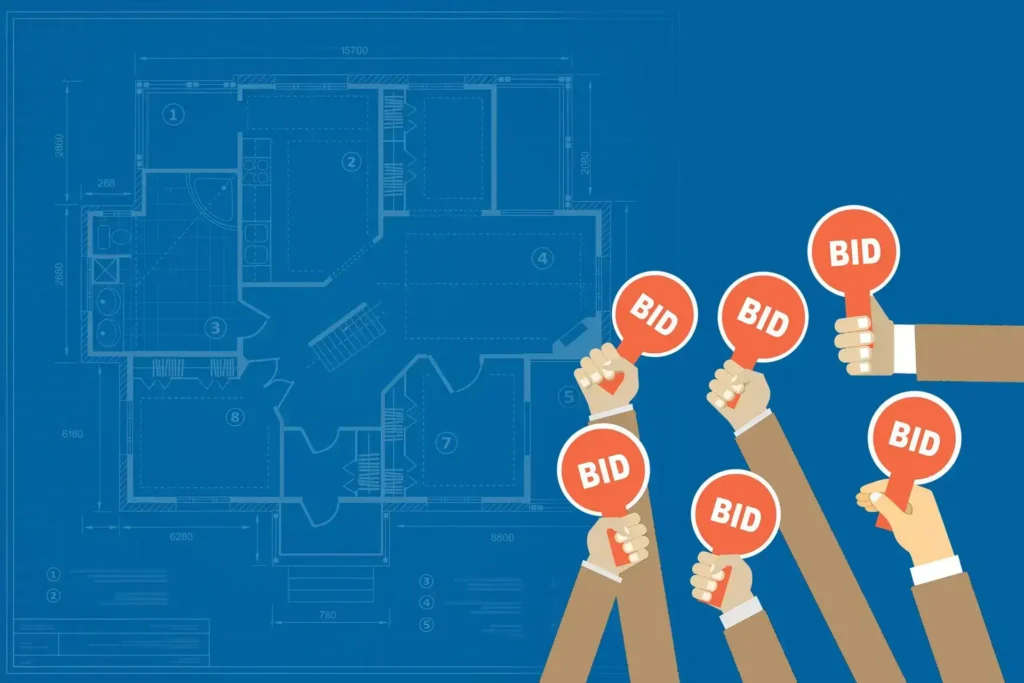Bidding for construction jobs is a big part of running a successful business in the construction industry. If you want to win more construction jobs with successful bids, you need an effective strategy. First, you have to understand how construction bidding works. Find a suitable construction contract to bid on, and follow up after bidding.
Although it seems a lot difficult and long process, we’ve got you covered. This guide will provide you with proven steps on how to bid for construction jobs and win more projects. Learn effective tips for creating successful construction bids and securing big contracts.
What is Construction Bidding?

Construction bidding is the process where contractors post their fees to do a project. When an organization or someone needs to do construction work, they ask contractors to offer them bids. These bids include how much the work will cost, how much time it will take, and what materials will be used. Bidding intends to win the contract by offering a fair price and displaying that you can complete the project on time and within the budget. It’s like competing with other contractors to get chosen for the task.
How to Bid on Construction Jobs?
Here are some proven effective steps to follow when you’re planning to bid on a construction project. Follow these simple steps to get the tender of your choice.
1) Find the best contract for you
To bid successfully, you need to find the best contracts. Look for initiatives that fit your skills, experiences, and resources. Don’t try and bid on every project. Focus on the ones that match your team’s specialty. You can discover contracts by checking online platforms, local government tenders, or through connections with different professionals. By selecting the right jobs, you increase your chances of winning and completing the project properly.
2) Understand the construction tender
A construction tender is the official document that describes the project details. It consists of what work needs to be completed, the deadline, and any special requirements. Before you bid, carefully study the tender. Make sure you have understood the overall project.
Pay attention to deadlines, materials needed, and any relevant permit. If something is uncertain, ask questions. This will help you avoid errors when you plan your bid.
3) Align your bid according to the project
Once you understand the tender, you need to align your bid with the project’s needs. This step adjusts your bid to match the budget, timeline, and materials stated in the contract. Show that you understand the project’s specific requirements. Be clear about how you’ll handle challenges and make sure your pricing is fair. A bid that fits the project properly is much more likely to win.
4) Submit the construction bid
After preparing your bid, it’s time to submit it. Make sure you comply with the instructions in the tender carefully. Include all the important files, like cost estimates, timelines, and other requested information. Double-test your bid for accuracy and completeness. Submitting a clean, expert bid on time shows that you are organized and serious about the contract.
5) Follow-up
After submitting your bid, it’s important to follow up. Check with the client or manager to ensure they received your bid and ask if they want any extra information. Following up indicates that you are interested and proactive. It also helps keep you on the customer’s radar when he’s selecting the contractor.
Tips to Create a Successful Construction Bid
Read the Tender Carefully: Make sure you understand all the details and requirements.
Be Clear and Concise: Use simple language and get straight to the point in your bid.
Provide Detailed Costs: Break down your costs clearly so the client knows what they are
paying for.
Highlight Your Experience: Share past projects that are similar to show your skills.
Show Your Team: Mention who will work on the project and their qualifications.
Include a Timeline: Provide a realistic schedule for completing the work.
Be Competitive but Fair: Offer a good price, but don’t underbid too much.
Proofread Your Bid: Check for errors and make sure everything is clear before submitting.
Follow-Up After Submission: Contact the client to show your interest and answer any questions they might have.
Conclusion
If you’re planning to get more contracts, try to follow these strategies. First, find the construction job that suits your team’s specialty. Understand the tender properly, then share the bid. Include all the important points in the bid. It should include a clear understanding of the project, material needed, deadline, and budget. Follow up with the clients to show that you’re truly interested. A detailed bid about the project including specific requirements is more likely to win.
FAQs
Q1. What is construction bidding?
Construction bidding is the process where contractors submit proposals to complete a construction project. These proposals include details like the cost of the project, how long it will take, and what materials will be used. The goal is to win the job by offering a competitive price and demonstrating the ability to meet the project’s requirements.
Q2. Why construction bidding is important?
Construction bidding is important because it helps clients find the right contractor for their projects. It allows contractors to showcase their skills and experience while competing for jobs. A well-structured bidding process ensures that projects are completed on time and within budget, benefiting both clients and contractors.
Q3. Types of bidding in construction
There are several types of bidding in construction, including:
- Open bidding: Anyone can submit a bid, which encourages competition and can lower costs.
- Closed bidding: Only invited contractors can submit bids, often used for larger or more complex projects.
- Negotiated bidding: The client negotiates directly with a selected contractor, usually when the contractor has prior experience or a good relationship with the client.
Q4. What should be included in the construction bid?
- Cost estimates
- Timeline
- Project description
- Qualifications
- Terms and conditions


